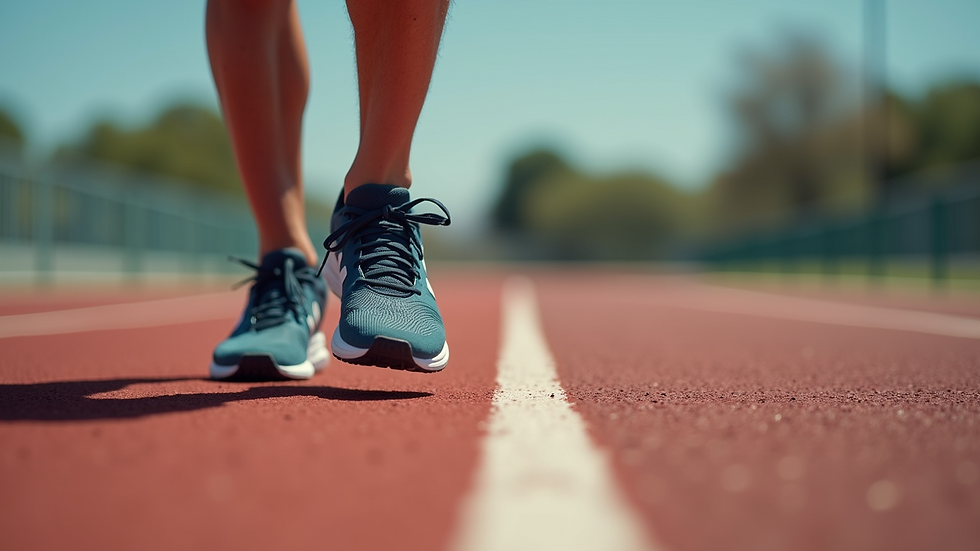Grieving and Competing: How the Dual Process Model Supports Athletes in Loss
- Dr Paul McCarthy

- Jul 25, 2025
- 4 min read
Grief is a universal experience, but for athletes, the relationship between loss and their sport can be especially challenging. When an athlete loses a loved one, it can significantly impact their performance, often leading to emotional turbulence. Navigating this complexity requires understanding and effective coping mechanisms. One powerful framework that can help is the Dual Process Model (DPM). This model provides insights into how athletes can alternate between experiencing grief and maintaining their competitive spirit.
Understanding the Dual Process Model
The Dual Process Model, created by Margaret Stroebe and Henk Schut, identifies two main ways people cope with grief: loss-oriented coping and restoration-oriented coping.
Loss-oriented coping is all about confronting grief. This might involve allowing oneself to cry, remembering the loved one, or engaging in activities that bring up feelings of loss. Engaging in these emotions helps in processing grief rather than suppressing it.
On the other hand, restoration-oriented coping focuses on adapting to life after loss. This can include taking on new challenges, resetting goals, and focusing on athletic training. For athletes, this coping can provide stability and a sense of purpose.
Research shows that both coping strategies are vital for recovery. In fact, a study involving over 1,000 bereaved individuals found that oscillating between these two coping styles can lead to better emotional outcomes. Therefore, athletes can benefit by blending both approaches.
The Impact of Grief in Sport
Grief can manifest in various ways in an athlete’s life, often affecting their mental health and performance. Initial responses to loss typically include decreased focus, motivation, and even physical symptoms like headaches or fatigue. According to a survey of athletes, nearly 75% reported that their performance dipped significantly after experiencing a personal loss.
However, approaching grief through restoration-oriented coping can help athletes find strength. For example, a football player who recently lost a parent might channel their feelings into practice, seeing it as a tribute to their loved one. This approach not only honors their grief but can also enhance their performance by providing a renewed sense of purpose.
Oscillation in Grieving: A Healthy Approach
Oscillation between grieving and competing is essential for understanding how athletes can handle their emotions. An athlete may feel the need to allow themselves to mourn one day, then focus on competition the next.
For instance, consider a basketball player who takes a moment to honor their lost family member by dedicating a game or scoring point to them before returning to competitive focus. This practice allows them to acknowledge their loss while still being engaged in their sport.
Recognizing this natural oscillation empowers athletes. It helps them realize that acknowledging grief and striving for performance are not mutually exclusive. This understanding fosters emotional resilience, equipping athletes to navigate both their feelings and their sport more effectively.
Coping with Loss in Athletics
Athletes facing bereavement can adopt several effective strategies to manage their grief:
Open Communication: It is crucial for athletes to express their feelings, whether with teammates, coaches, or psychologists. Speaking about grief can provide relief and promote understanding.
Routine Adjustment: While keeping a structured schedule can offer comfort, allowing for flexibility is vital. Moments of grief require that athletes adapt their routines to accommodate their emotions.
Temporary Breaks: Sometimes, stepping back is necessary. A short break from training can give athletes the space to process their feelings. Research indicates that athletes who allow themselves time to heal often return stronger and more focused.
Utilizing Support Networks: Engaging with family, friends, or counseling services can provide essential support. Being part of a community can remind athletes that they are not alone in their experience.
Mindfulness and Reflection: Activities like meditation or journaling can help athletes to process their emotions. These practices encourage moments of quiet reflection, which can be incredibly grounding during difficult times.

The Role of Sport Psychology in Grieving
Sport psychology plays a crucial role in supporting athletes through grief. Professionals can create tailored strategies to help athletes manage their emotions while still focusing on training.
Support groups led by sport psychologists can facilitate a shared understanding among athletes. These groups break down the stigma of discussing grief in sports. A 2022 study found that participants in such groups reported a 35% increase in their ability to cope with grief.
Additionally, sport psychologists can introduce resilience-building techniques. Athletes can learn mental conditioning, visualization practices, and stress management strategies that enhance both performance and emotional health.
Recovery After Bereavement: A Holistic Approach
Recovering from loss is a complex journey that requires attention to emotional, physical, and social aspects. For athletes, this journey often involves ups and downs. The path is not always straightforward, but with the right approaches, it is possible to find balance.
Integrating practice with grief processing creates a more supportive environment. Athletes can channel their grief into their sport, transforming what feels overwhelming into a source of strength.
Ultimately, the journey of grieving and competing is deeply personal. Engaging with the Dual Process Model offers athletes a structured way to navigate their emotions. This model can lead to emotional resilience and recovery, ensuring that they can honor their losses while pursuing their passion for athletics.
Reflecting on Grief and Performance
Grief is an unavoidable aspect of life and comes with unique challenges for athletes. Understanding the dynamics of grief through the lens of the Dual Process Model is crucial for navigating loss and sustaining athletic performance.
By recognizing the need to shift between loss-oriented and restoration-oriented coping strategies, athletes can build resilience. Grief can become an opportunity for reflective growth and connection, ultimately deepening their relationship with both their sport and themselves.








